Phil 1901 - Justice Discussion: Examining Sweatshops and Exploitation
VerifiedAdded on 2023/04/17
|7
|1429
|252
Essay
AI Summary
This essay explores the ethical dilemmas surrounding sweatshops, focusing on the exploitation of workers and the moral implications of their choices. It examines arguments related to exploitative wages, the role of multinational enterprises (MNEs), and the ethical significance of workers' consent to sweatshop conditions. The discussion references Zwolinski's work on sweatshops, choice, and exploitation, highlighting the complexities of intervention by third parties and the balance between worker autonomy and fair labor practices. The essay also addresses the issue of managerial abuse and questions whether accepting low-wage labor justifies emotional abuse experienced in sweatshops, ultimately arguing that while sweatshop labor may be the best available option for some workers, it does not excuse unethical treatment.
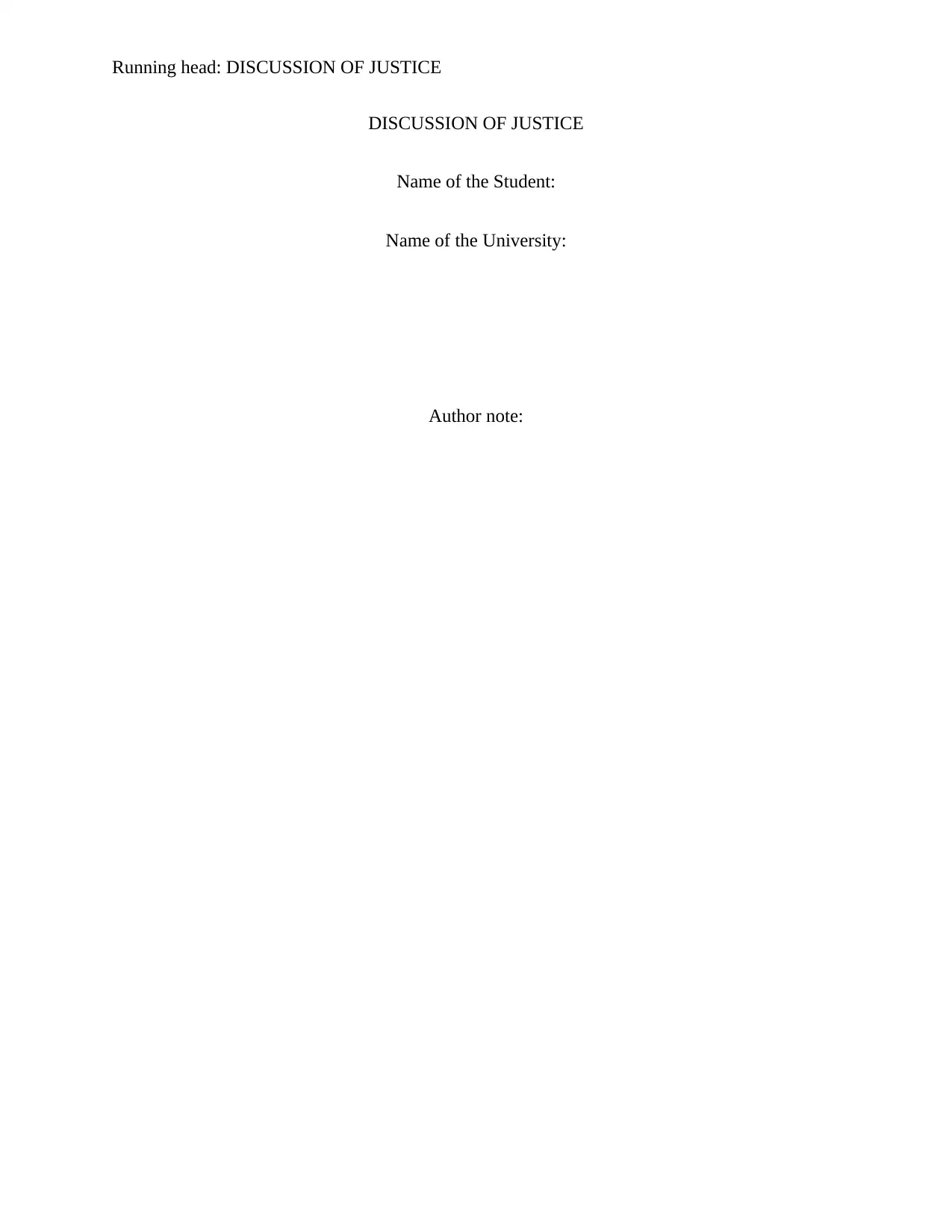
Running head: DISCUSSION OF JUSTICE
DISCUSSION OF JUSTICE
Name of the Student:
Name of the University:
Author note:
DISCUSSION OF JUSTICE
Name of the Student:
Name of the University:
Author note:
Paraphrase This Document
Need a fresh take? Get an instant paraphrase of this document with our AI Paraphraser
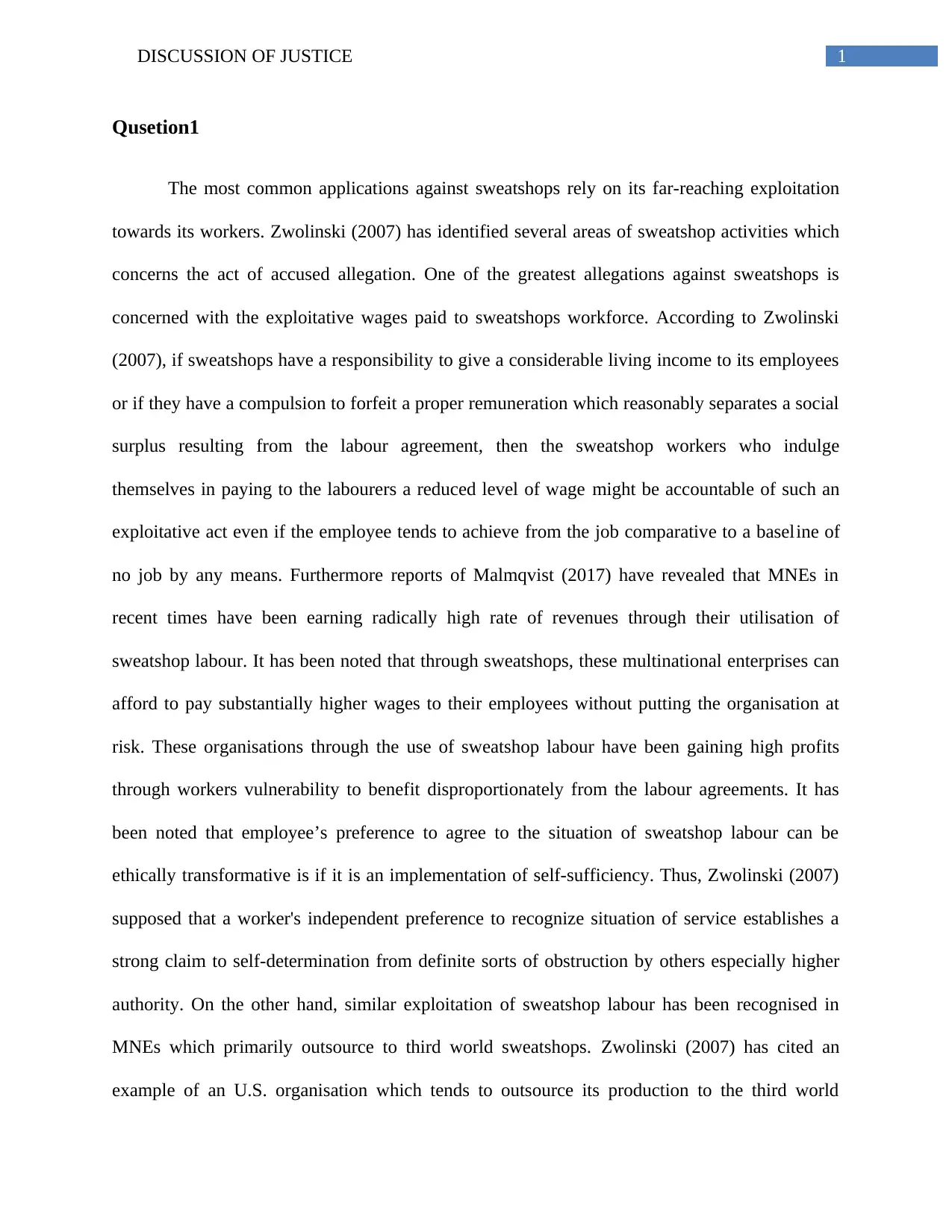
1DISCUSSION OF JUSTICE
Qusetion1
The most common applications against sweatshops rely on its far-reaching exploitation
towards its workers. Zwolinski (2007) has identified several areas of sweatshop activities which
concerns the act of accused allegation. One of the greatest allegations against sweatshops is
concerned with the exploitative wages paid to sweatshops workforce. According to Zwolinski
(2007), if sweatshops have a responsibility to give a considerable living income to its employees
or if they have a compulsion to forfeit a proper remuneration which reasonably separates a social
surplus resulting from the labour agreement, then the sweatshop workers who indulge
themselves in paying to the labourers a reduced level of wage might be accountable of such an
exploitative act even if the employee tends to achieve from the job comparative to a baseline of
no job by any means. Furthermore reports of Malmqvist (2017) have revealed that MNEs in
recent times have been earning radically high rate of revenues through their utilisation of
sweatshop labour. It has been noted that through sweatshops, these multinational enterprises can
afford to pay substantially higher wages to their employees without putting the organisation at
risk. These organisations through the use of sweatshop labour have been gaining high profits
through workers vulnerability to benefit disproportionately from the labour agreements. It has
been noted that employee’s preference to agree to the situation of sweatshop labour can be
ethically transformative is if it is an implementation of self-sufficiency. Thus, Zwolinski (2007)
supposed that a worker's independent preference to recognize situation of service establishes a
strong claim to self-determination from definite sorts of obstruction by others especially higher
authority. On the other hand, similar exploitation of sweatshop labour has been recognised in
MNEs which primarily outsource to third world sweatshops. Zwolinski (2007) has cited an
example of an U.S. organisation which tends to outsource its production to the third world
Qusetion1
The most common applications against sweatshops rely on its far-reaching exploitation
towards its workers. Zwolinski (2007) has identified several areas of sweatshop activities which
concerns the act of accused allegation. One of the greatest allegations against sweatshops is
concerned with the exploitative wages paid to sweatshops workforce. According to Zwolinski
(2007), if sweatshops have a responsibility to give a considerable living income to its employees
or if they have a compulsion to forfeit a proper remuneration which reasonably separates a social
surplus resulting from the labour agreement, then the sweatshop workers who indulge
themselves in paying to the labourers a reduced level of wage might be accountable of such an
exploitative act even if the employee tends to achieve from the job comparative to a baseline of
no job by any means. Furthermore reports of Malmqvist (2017) have revealed that MNEs in
recent times have been earning radically high rate of revenues through their utilisation of
sweatshop labour. It has been noted that through sweatshops, these multinational enterprises can
afford to pay substantially higher wages to their employees without putting the organisation at
risk. These organisations through the use of sweatshop labour have been gaining high profits
through workers vulnerability to benefit disproportionately from the labour agreements. It has
been noted that employee’s preference to agree to the situation of sweatshop labour can be
ethically transformative is if it is an implementation of self-sufficiency. Thus, Zwolinski (2007)
supposed that a worker's independent preference to recognize situation of service establishes a
strong claim to self-determination from definite sorts of obstruction by others especially higher
authority. On the other hand, similar exploitation of sweatshop labour has been recognised in
MNEs which primarily outsource to third world sweatshops. Zwolinski (2007) has cited an
example of an U.S. organisation which tends to outsource its production to the third world
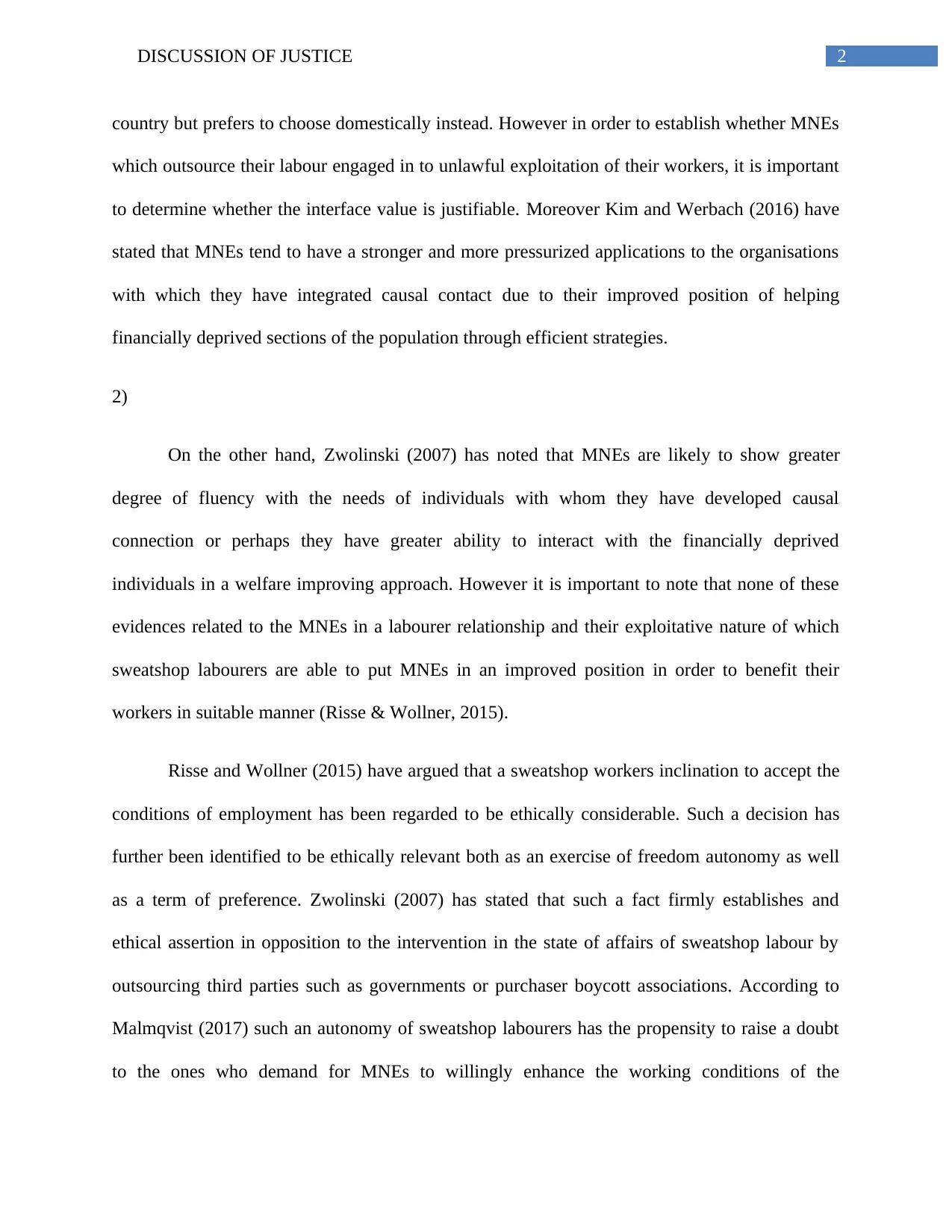
2DISCUSSION OF JUSTICE
country but prefers to choose domestically instead. However in order to establish whether MNEs
which outsource their labour engaged in to unlawful exploitation of their workers, it is important
to determine whether the interface value is justifiable. Moreover Kim and Werbach (2016) have
stated that MNEs tend to have a stronger and more pressurized applications to the organisations
with which they have integrated causal contact due to their improved position of helping
financially deprived sections of the population through efficient strategies.
2)
On the other hand, Zwolinski (2007) has noted that MNEs are likely to show greater
degree of fluency with the needs of individuals with whom they have developed causal
connection or perhaps they have greater ability to interact with the financially deprived
individuals in a welfare improving approach. However it is important to note that none of these
evidences related to the MNEs in a labourer relationship and their exploitative nature of which
sweatshop labourers are able to put MNEs in an improved position in order to benefit their
workers in suitable manner (Risse & Wollner, 2015).
Risse and Wollner (2015) have argued that a sweatshop workers inclination to accept the
conditions of employment has been regarded to be ethically considerable. Such a decision has
further been identified to be ethically relevant both as an exercise of freedom autonomy as well
as a term of preference. Zwolinski (2007) has stated that such a fact firmly establishes and
ethical assertion in opposition to the intervention in the state of affairs of sweatshop labour by
outsourcing third parties such as governments or purchaser boycott associations. According to
Malmqvist (2017) such an autonomy of sweatshop labourers has the propensity to raise a doubt
to the ones who demand for MNEs to willingly enhance the working conditions of the
country but prefers to choose domestically instead. However in order to establish whether MNEs
which outsource their labour engaged in to unlawful exploitation of their workers, it is important
to determine whether the interface value is justifiable. Moreover Kim and Werbach (2016) have
stated that MNEs tend to have a stronger and more pressurized applications to the organisations
with which they have integrated causal contact due to their improved position of helping
financially deprived sections of the population through efficient strategies.
2)
On the other hand, Zwolinski (2007) has noted that MNEs are likely to show greater
degree of fluency with the needs of individuals with whom they have developed causal
connection or perhaps they have greater ability to interact with the financially deprived
individuals in a welfare improving approach. However it is important to note that none of these
evidences related to the MNEs in a labourer relationship and their exploitative nature of which
sweatshop labourers are able to put MNEs in an improved position in order to benefit their
workers in suitable manner (Risse & Wollner, 2015).
Risse and Wollner (2015) have argued that a sweatshop workers inclination to accept the
conditions of employment has been regarded to be ethically considerable. Such a decision has
further been identified to be ethically relevant both as an exercise of freedom autonomy as well
as a term of preference. Zwolinski (2007) has stated that such a fact firmly establishes and
ethical assertion in opposition to the intervention in the state of affairs of sweatshop labour by
outsourcing third parties such as governments or purchaser boycott associations. According to
Malmqvist (2017) such an autonomy of sweatshop labourers has the propensity to raise a doubt
to the ones who demand for MNEs to willingly enhance the working conditions of the
⊘ This is a preview!⊘
Do you want full access?
Subscribe today to unlock all pages.

Trusted by 1+ million students worldwide
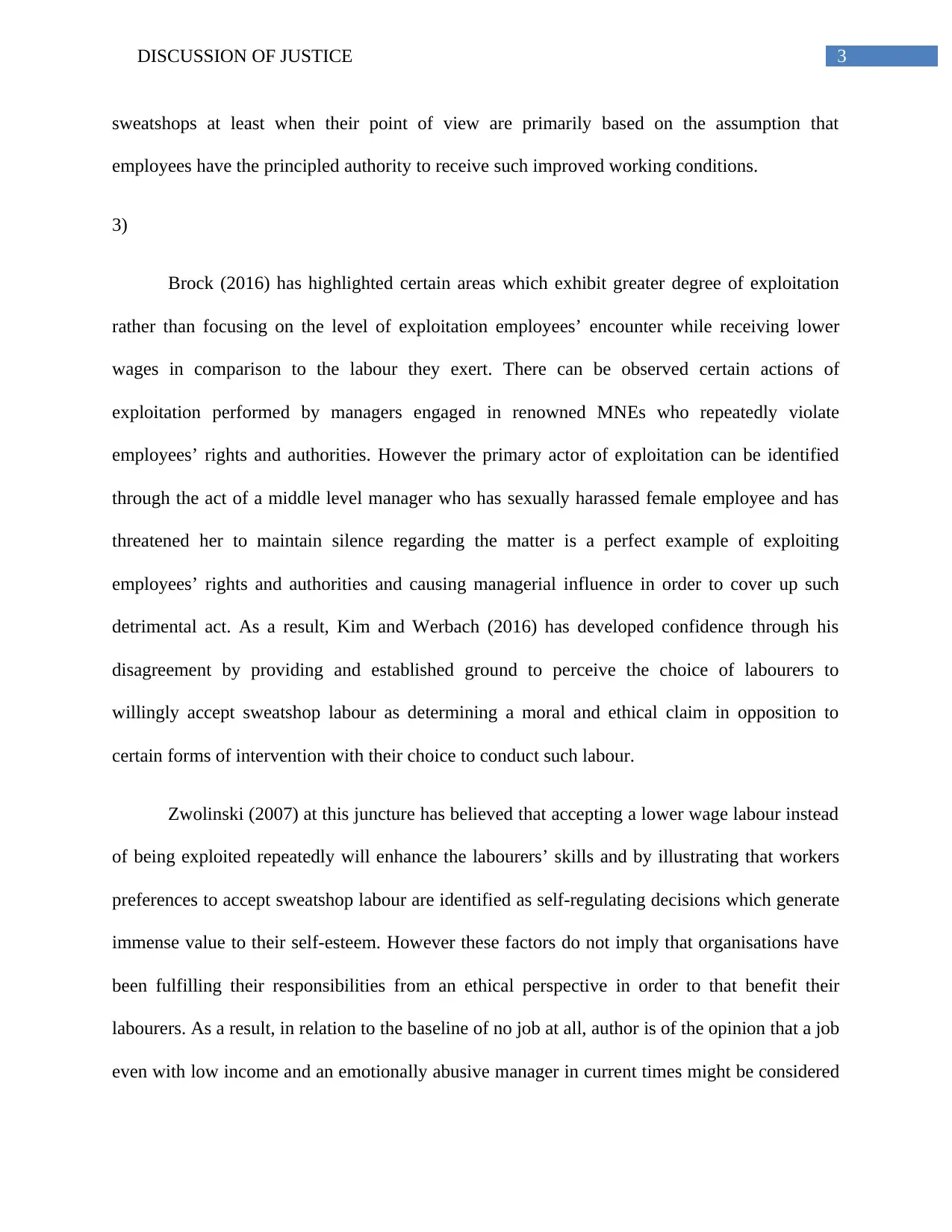
3DISCUSSION OF JUSTICE
sweatshops at least when their point of view are primarily based on the assumption that
employees have the principled authority to receive such improved working conditions.
3)
Brock (2016) has highlighted certain areas which exhibit greater degree of exploitation
rather than focusing on the level of exploitation employees’ encounter while receiving lower
wages in comparison to the labour they exert. There can be observed certain actions of
exploitation performed by managers engaged in renowned MNEs who repeatedly violate
employees’ rights and authorities. However the primary actor of exploitation can be identified
through the act of a middle level manager who has sexually harassed female employee and has
threatened her to maintain silence regarding the matter is a perfect example of exploiting
employees’ rights and authorities and causing managerial influence in order to cover up such
detrimental act. As a result, Kim and Werbach (2016) has developed confidence through his
disagreement by providing and established ground to perceive the choice of labourers to
willingly accept sweatshop labour as determining a moral and ethical claim in opposition to
certain forms of intervention with their choice to conduct such labour.
Zwolinski (2007) at this juncture has believed that accepting a lower wage labour instead
of being exploited repeatedly will enhance the labourers’ skills and by illustrating that workers
preferences to accept sweatshop labour are identified as self-regulating decisions which generate
immense value to their self-esteem. However these factors do not imply that organisations have
been fulfilling their responsibilities from an ethical perspective in order to that benefit their
labourers. As a result, in relation to the baseline of no job at all, author is of the opinion that a job
even with low income and an emotionally abusive manager in current times might be considered
sweatshops at least when their point of view are primarily based on the assumption that
employees have the principled authority to receive such improved working conditions.
3)
Brock (2016) has highlighted certain areas which exhibit greater degree of exploitation
rather than focusing on the level of exploitation employees’ encounter while receiving lower
wages in comparison to the labour they exert. There can be observed certain actions of
exploitation performed by managers engaged in renowned MNEs who repeatedly violate
employees’ rights and authorities. However the primary actor of exploitation can be identified
through the act of a middle level manager who has sexually harassed female employee and has
threatened her to maintain silence regarding the matter is a perfect example of exploiting
employees’ rights and authorities and causing managerial influence in order to cover up such
detrimental act. As a result, Kim and Werbach (2016) has developed confidence through his
disagreement by providing and established ground to perceive the choice of labourers to
willingly accept sweatshop labour as determining a moral and ethical claim in opposition to
certain forms of intervention with their choice to conduct such labour.
Zwolinski (2007) at this juncture has believed that accepting a lower wage labour instead
of being exploited repeatedly will enhance the labourers’ skills and by illustrating that workers
preferences to accept sweatshop labour are identified as self-regulating decisions which generate
immense value to their self-esteem. However these factors do not imply that organisations have
been fulfilling their responsibilities from an ethical perspective in order to that benefit their
labourers. As a result, in relation to the baseline of no job at all, author is of the opinion that a job
even with low income and an emotionally abusive manager in current times might be considered
Paraphrase This Document
Need a fresh take? Get an instant paraphrase of this document with our AI Paraphraser
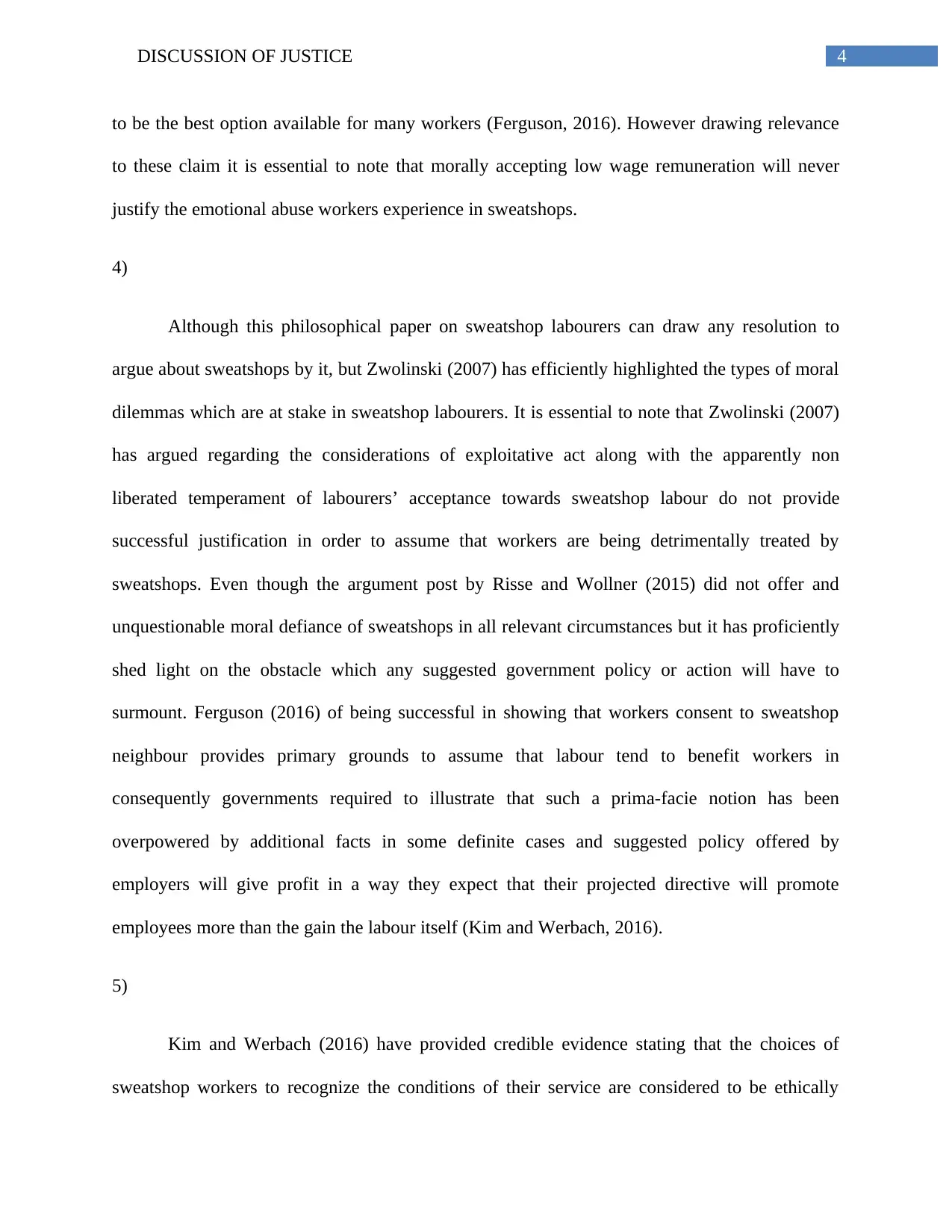
4DISCUSSION OF JUSTICE
to be the best option available for many workers (Ferguson, 2016). However drawing relevance
to these claim it is essential to note that morally accepting low wage remuneration will never
justify the emotional abuse workers experience in sweatshops.
4)
Although this philosophical paper on sweatshop labourers can draw any resolution to
argue about sweatshops by it, but Zwolinski (2007) has efficiently highlighted the types of moral
dilemmas which are at stake in sweatshop labourers. It is essential to note that Zwolinski (2007)
has argued regarding the considerations of exploitative act along with the apparently non
liberated temperament of labourers’ acceptance towards sweatshop labour do not provide
successful justification in order to assume that workers are being detrimentally treated by
sweatshops. Even though the argument post by Risse and Wollner (2015) did not offer and
unquestionable moral defiance of sweatshops in all relevant circumstances but it has proficiently
shed light on the obstacle which any suggested government policy or action will have to
surmount. Ferguson (2016) of being successful in showing that workers consent to sweatshop
neighbour provides primary grounds to assume that labour tend to benefit workers in
consequently governments required to illustrate that such a prima-facie notion has been
overpowered by additional facts in some definite cases and suggested policy offered by
employers will give profit in a way they expect that their projected directive will promote
employees more than the gain the labour itself (Kim and Werbach, 2016).
5)
Kim and Werbach (2016) have provided credible evidence stating that the choices of
sweatshop workers to recognize the conditions of their service are considered to be ethically
to be the best option available for many workers (Ferguson, 2016). However drawing relevance
to these claim it is essential to note that morally accepting low wage remuneration will never
justify the emotional abuse workers experience in sweatshops.
4)
Although this philosophical paper on sweatshop labourers can draw any resolution to
argue about sweatshops by it, but Zwolinski (2007) has efficiently highlighted the types of moral
dilemmas which are at stake in sweatshop labourers. It is essential to note that Zwolinski (2007)
has argued regarding the considerations of exploitative act along with the apparently non
liberated temperament of labourers’ acceptance towards sweatshop labour do not provide
successful justification in order to assume that workers are being detrimentally treated by
sweatshops. Even though the argument post by Risse and Wollner (2015) did not offer and
unquestionable moral defiance of sweatshops in all relevant circumstances but it has proficiently
shed light on the obstacle which any suggested government policy or action will have to
surmount. Ferguson (2016) of being successful in showing that workers consent to sweatshop
neighbour provides primary grounds to assume that labour tend to benefit workers in
consequently governments required to illustrate that such a prima-facie notion has been
overpowered by additional facts in some definite cases and suggested policy offered by
employers will give profit in a way they expect that their projected directive will promote
employees more than the gain the labour itself (Kim and Werbach, 2016).
5)
Kim and Werbach (2016) have provided credible evidence stating that the choices of
sweatshop workers to recognize the conditions of their service are considered to be ethically
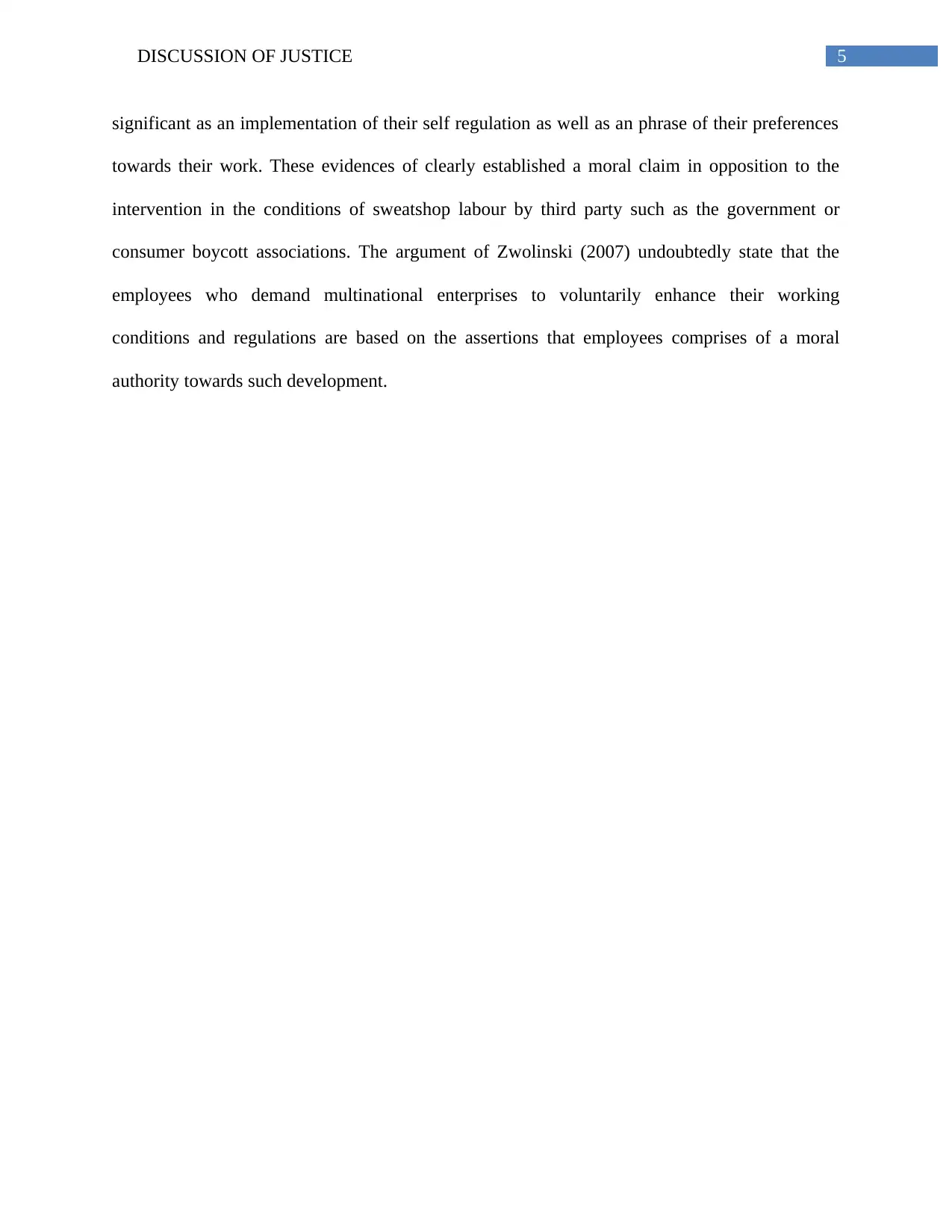
5DISCUSSION OF JUSTICE
significant as an implementation of their self regulation as well as an phrase of their preferences
towards their work. These evidences of clearly established a moral claim in opposition to the
intervention in the conditions of sweatshop labour by third party such as the government or
consumer boycott associations. The argument of Zwolinski (2007) undoubtedly state that the
employees who demand multinational enterprises to voluntarily enhance their working
conditions and regulations are based on the assertions that employees comprises of a moral
authority towards such development.
significant as an implementation of their self regulation as well as an phrase of their preferences
towards their work. These evidences of clearly established a moral claim in opposition to the
intervention in the conditions of sweatshop labour by third party such as the government or
consumer boycott associations. The argument of Zwolinski (2007) undoubtedly state that the
employees who demand multinational enterprises to voluntarily enhance their working
conditions and regulations are based on the assertions that employees comprises of a moral
authority towards such development.
⊘ This is a preview!⊘
Do you want full access?
Subscribe today to unlock all pages.

Trusted by 1+ million students worldwide
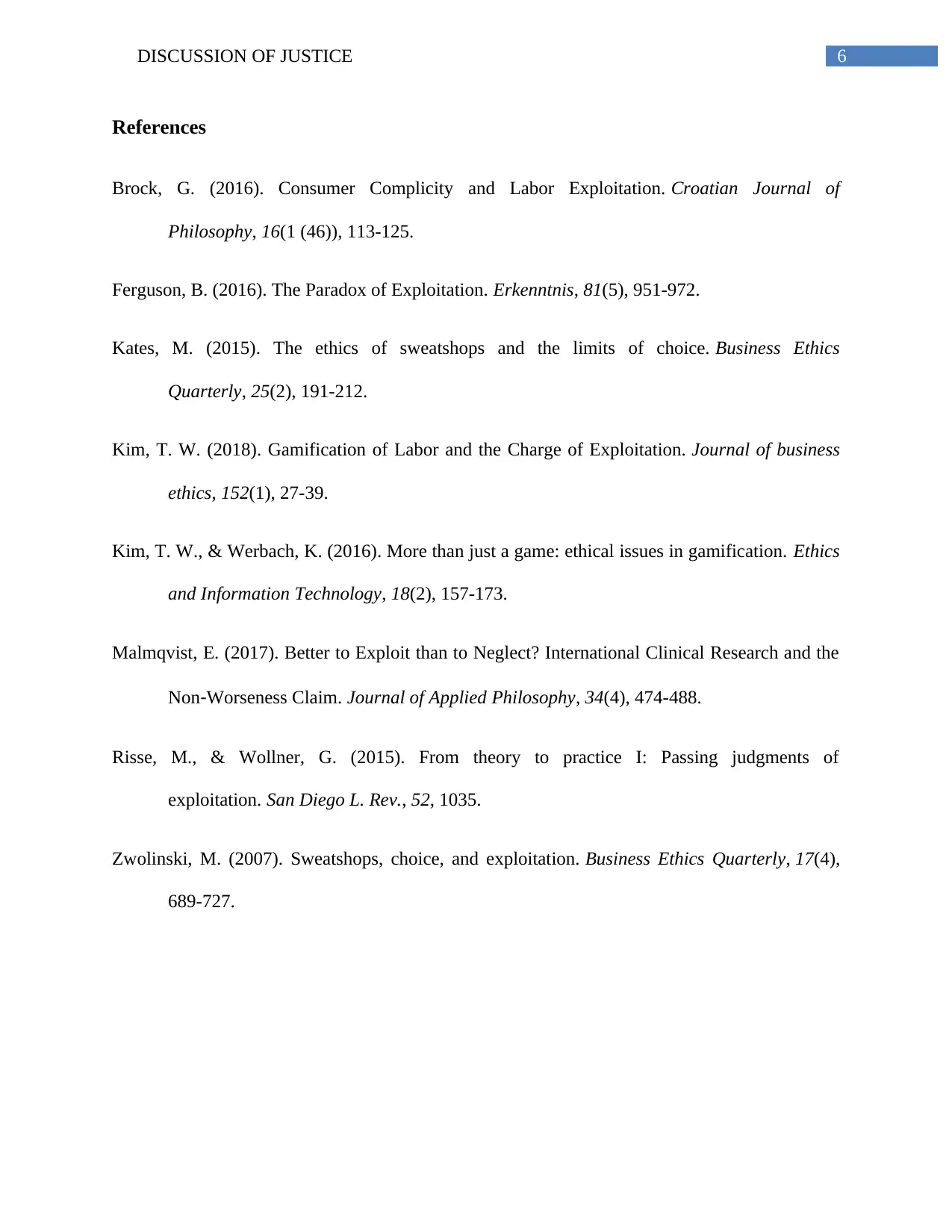
6DISCUSSION OF JUSTICE
References
Brock, G. (2016). Consumer Complicity and Labor Exploitation. Croatian Journal of
Philosophy, 16(1 (46)), 113-125.
Ferguson, B. (2016). The Paradox of Exploitation. Erkenntnis, 81(5), 951-972.
Kates, M. (2015). The ethics of sweatshops and the limits of choice. Business Ethics
Quarterly, 25(2), 191-212.
Kim, T. W. (2018). Gamification of Labor and the Charge of Exploitation. Journal of business
ethics, 152(1), 27-39.
Kim, T. W., & Werbach, K. (2016). More than just a game: ethical issues in gamification. Ethics
and Information Technology, 18(2), 157-173.
Malmqvist, E. (2017). Better to Exploit than to Neglect? International Clinical Research and the
Non‐Worseness Claim. Journal of Applied Philosophy, 34(4), 474-488.
Risse, M., & Wollner, G. (2015). From theory to practice I: Passing judgments of
exploitation. San Diego L. Rev., 52, 1035.
Zwolinski, M. (2007). Sweatshops, choice, and exploitation. Business Ethics Quarterly, 17(4),
689-727.
References
Brock, G. (2016). Consumer Complicity and Labor Exploitation. Croatian Journal of
Philosophy, 16(1 (46)), 113-125.
Ferguson, B. (2016). The Paradox of Exploitation. Erkenntnis, 81(5), 951-972.
Kates, M. (2015). The ethics of sweatshops and the limits of choice. Business Ethics
Quarterly, 25(2), 191-212.
Kim, T. W. (2018). Gamification of Labor and the Charge of Exploitation. Journal of business
ethics, 152(1), 27-39.
Kim, T. W., & Werbach, K. (2016). More than just a game: ethical issues in gamification. Ethics
and Information Technology, 18(2), 157-173.
Malmqvist, E. (2017). Better to Exploit than to Neglect? International Clinical Research and the
Non‐Worseness Claim. Journal of Applied Philosophy, 34(4), 474-488.
Risse, M., & Wollner, G. (2015). From theory to practice I: Passing judgments of
exploitation. San Diego L. Rev., 52, 1035.
Zwolinski, M. (2007). Sweatshops, choice, and exploitation. Business Ethics Quarterly, 17(4),
689-727.
1 out of 7
Related Documents
Your All-in-One AI-Powered Toolkit for Academic Success.
+13062052269
info@desklib.com
Available 24*7 on WhatsApp / Email
![[object Object]](/_next/static/media/star-bottom.7253800d.svg)
Unlock your academic potential
Copyright © 2020–2026 A2Z Services. All Rights Reserved. Developed and managed by ZUCOL.





